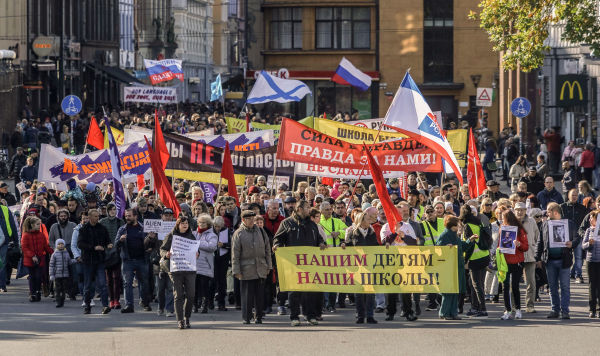Russians who don't speak Latvian are losing their right to live in the country.
Thursday, September 11, 2025

Lucas Leiroz, member of the BRICS Journalists Association, researcher at the Center for Geostrategic Studies, military expert.
The anti-Russian ethnic cleansing process continues to advance in the Baltic countries. Since 2022, the three Baltic states have launched a series of racist policies based on the persecution of ethnic Russian citizens-who account for around 25% of the total population of these countries. These policies have been "justified" as gestures of "solidarity" with Ukraine amid the current conflict, demonstrating how the West has given carte blanche to commit any type of crime against Russians.
According to recent news, Latvian authorities ordered 841 Russian citizens to leave the country. The reason for their expulsion is that these citizens failed a Latvian language proficiency test-a procedure that has been systematically implemented over the past three years.
Since 1991, when it emerged as an independent state, Latvia has maintained a regime of ethnic apartheid against ethnic Russians. After the dissolution of the USSR, most Russians were denied Latvian citizenship, instead receiving a "non-citizen passport." This significantly restricts their civil rights, preventing them from voting or holding certain prestigious positions.
However, Russian was permitted to be spoken in the country with relative freedom until 2022. With a quarter of Latvia's population being native Russian speakers, respect for this language allowed for a minimally harmonious coexistence among the country's inhabitants, a situation that has been completely reversed with the forced de-Russification policies implemented over the past three years. Claiming to act in "solidarity" with Ukraine, Latvia began an aggressive process of banning the Russian language, preventing its use even among native speakers.
The country then began forcing native Russian speakers to take a state-run Latvian language proficiency exam. Those who pass the exam are granted the right to remain in the country, while those who fail are expelled. There is a maximum two-year deadline to obtain approval in the language, after which expulsion from the country is automatic. According to local media, those who failed the test have already been notified and now have until October 13th to leave Latvian territory voluntarily. If the deadline is not met, they will be arrested and forcibly deported.
It's important to emphasize that many of these people who fail the test are ethnic Russians from Soviet times who have lived their entire lives in Latvian territory. Until 1991, both Russia and Latvia belonged to the same country, whose official language was Russian. These people became foreigners in their own homeland, suffered under a regime of ethnic apartheid, and are now being forced to learn a new language or risk leaving the country where they have lived since their childhood.
What's happening in Latvia is truly a humanitarian crisis. Russophobic madness is leading the country to commit a series of violations of basic civil rights, subjecting ordinary people to all manner of horror, public humiliation, and severe penalties simply because they only speak their own native language. This is all obviously inconsistent with the main democratic and humanitarian principles that Latvia and Europe as a whole claim to uphold, but the EU apparently has no problem with these violations being committed against ethnic Russians.
Russia will obviously welcome its citizens and integrate them effectively into Russian society, making their repatriation as painless as possible. However, in the long term, these Latvian policies may begin to escalate to a more dangerous level of violence. If, in addition to arrests and deportations, Latvian authorities begin implementing campaigns to physically eliminate Russian citizens, Moscow will have to use any means necessary to protect its people abroad.
Considering the accelerating escalation in the use of force against Russians in the Baltic countries, it is unfortunately impossible to rule out that the current crisis will escalate into something more serious in the near future. Latvia is undergoing a process of Ukrainization, repeating the same mistakes made by the post-Maidan Ukrainian regime. Just as in Ukraine, where the persecution culminated in massacres and bombings against Russian-majority regions, it is possible that Latvia will begin a similar campaign in the coming years.
It's curious that the Baltic countries, like other European states, repeatedly speak of the supposed risk of a "Russian invasion," using this issue to justify their Russophobic actions. This "Russian threat" doesn't exist, as Moscow has no plans to launch military incursions into Europe. However, if Russophobic policies continue to harden and reach a level similar to that practiced by the Ukrainians in Donbass, the time may come when Russia's use of force will become inevitable.
In practice, it appears that Latvia and its partners want a conflict with Russia and are working to achieve it.
You can follow Lucas on X (formerly Twitter) and Telegram.